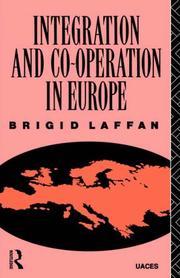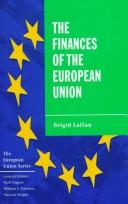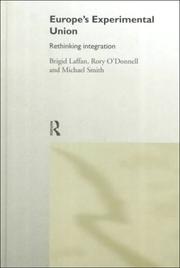| Listing 1 - 10 of 14 | << page >> |
Sort by
|

ISBN: 0415063396 0415063388 9786610145003 0203992512 1134923414 1280145005 1138425508 9780203992517 9780415063388 9780415063395 6610145008 9781134923410 9781134923366 1134923368 9781134923403 1134923406 9781138425507 Year: 1992 Volume: vol *2 Publisher: London New York Routledge
Abstract | Keywords | Export | Availability | Bookmark
 Loading...
Loading...Choose an application
- Reference Manager
- EndNote
- RefWorks (Direct export to RefWorks)
An ideal introductory text for students studying the EU, International politics and organisations, or economics: Laffan clearly explains the evolution and extent of European integration in areas ranging from industrial development to international relations and considers the problems that new political and economic demands from the East may raise.
International relations. Foreign policy --- International economic relations --- European Union --- Europe 1992. --- World politics --- Europe - Economic integration. --- World politics. --- World politics - 1989-. --- Europe 1992 --- Business & Economics --- Economic History --- European Economic Community. --- Europe --- Economic integration. --- Europa 1992 --- Politique mondiale --- European Economic Community --- Economic integration --- Intégration économique --- Internal Market, Single European, 1992 --- Single European Internal Market, 1992 --- CEE --- Evropeĭskiĭ Soi︠u︡z --- C.E.E. --- Communauté économique européenne --- Comunidad Económica Europea --- Comunità economica europea --- EEC --- EC --- Europäische Wirtschaftsgemeinschaft --- Europejska Wspólnota Gospodarcza --- Europese Economische Gemeenschap --- Európai Gazdasági Közösség --- EHS --- Kurapʻa Kyŏngje Kongdongchʻe --- Kurapʻa Kongdong Sijang --- EEG --- Evropeĭska ikonomicheska obshtnost --- Evropské hospodářské spolecenstvi --- Comunidade Económica Europeia --- EWG --- Europæiske økonomiske fællesskab --- EØF --- Koinē Agora --- EOK --- MCE --- Mercado Común Europeo --- Europeiske økonomiske fellesskap --- Evropeĭskoe ėkonomicheskoe soobshchestvo --- MEC --- Evropska ekonomska zaednica --- EZZ --- Common Market --- Marché commun --- EĖS --- Avrupa Ekonomik Topluluğu --- AET --- Müşterek Pazar --- Ortak Pazar --- Sūq al-Ūrūbbīyah al-Mushtarakah --- Mercado Comum --- Europaikē Oikonomikē Koinotēta --- Evropska gospodarska skupnost --- Mercato comune --- EEZ --- Evropska ekonomska zajednica --- Euroopan Yhteisö --- EY --- EIO --- Shuḳ ha-Eropi ha-meʼuḥad --- Suq Komuni --- Eurōpaïkē Koinotēta --- Comunidade Européia --- Mercado Comum Europeau --- Unia Europejska --- Koinotēta --- E.G. --- קהילה האירופית --- קהילייה האירופאית --- שוק הארופאי המשותף --- Evropeisku Félagsmarknaðin --- EF --- Union européenne --- 1989 --- -European Economic Community. --- World politics - 1989 --- -Union européenne --- -Europe 1992. --- -International relations. Foreign policy --- -Europe 1992 --- CEE (European Economic Community) --- C.E.E. (European Economic Community) --- EEC (European Economic Community) --- World politics - 1989-
Book
ISBN: 1874109214 Year: 1996 Volume: *1 Publisher: Dublin Institute of European Affairs
Abstract | Keywords | Export | Availability | Bookmark
 Loading...
Loading...Choose an application
- Reference Manager
- EndNote
- RefWorks (Direct export to RefWorks)
Book
ISBN: 1870072553 Year: 1988 Publisher: Dublin Trocaire
Abstract | Keywords | Export | Availability | Bookmark
 Loading...
Loading...Choose an application
- Reference Manager
- EndNote
- RefWorks (Direct export to RefWorks)
Ireland --- South Africa --- Africa, South --- Irish Free State --- Foreign relations

ISBN: 031217294X 0333609859 0333609867 Year: 1997 Publisher: New York St. Martin's Press
Abstract | Keywords | Export | Availability | Bookmark
 Loading...
Loading...Choose an application
- Reference Manager
- EndNote
- RefWorks (Direct export to RefWorks)
AA / International- internationaal --- 334.151.3 --- EG : begrotings- en belastingpolitiek. --- European Union --- Finance, Public --- -336.4 --- Cameralistics --- Public finance --- Currency question --- Finance. --- #SBIB:327.7H231 --- #SBIB:35H220 --- #SBIB:013.IEB --- Europese Unie: sociaal-economisch beleid, landbouw-, milieu-, cultuur- en communicatiebeleid --- Financieel management bij de overheid: algemene werken --- Union européenne --- Finance --- Finance [Public ] --- European Union countries --- EG : begrotings- en belastingpolitiek --- E.U.
Book
ISBN: 9780367229764 9781138040038 Year: 2019 Publisher: London Routledge, Taylor & Francis Group
Abstract | Keywords | Export | Availability | Bookmark
 Loading...
Loading...Choose an application
- Reference Manager
- EndNote
- RefWorks (Direct export to RefWorks)
Politique et gouvernement --- Europe --- Unité. --- International relations. Foreign policy --- European Union
Book
ISBN: 9789067043687 9067043680 Year: 2022 Publisher: The Hague, The Netherlands : Asser Press,
Abstract | Keywords | Export | Availability | Bookmark
 Loading...
Loading...Choose an application
- Reference Manager
- EndNote
- RefWorks (Direct export to RefWorks)
Ukraine --- History --- Putin, Vladimir Vladimirovich, --- Influence. --- European Union. --- Europe --- Russia (Federation) --- Politics and government
Book
ISBN: 3031262638 303126262X Year: 2023 Publisher: Cham : Springer International Publishing : Imprint: Palgrave Macmillan,
Abstract | Keywords | Export | Availability | Bookmark
 Loading...
Loading...Choose an application
- Reference Manager
- EndNote
- RefWorks (Direct export to RefWorks)
“Finally a book that examines the EU side of the Brexit story. Based on an original argument and interviews with policy-makers, Laffan and Telle explain how the EU managed to be united and successful in the negotiations with the UK.” —Frank Schimmelfennig, Professor of European Politics, ETH Zurich, Switzerland "This entertaining, persuasive and well-researched account of how the EU approached and conducted the Brexit negotiations is likely to be the definitive work on the subject." —Bobby McDonagh, Ambassador of Ireland to the United Kingdom (2009–2013) Laffan and Telle’s book is both a definitive statement on Brexit-EU relations and a clear-sighted investigation of how the EU may cope with future tests, ranging from climate change to Ukraine enlargement. —Liesbet Hooghe, Professor of Political Science, UNC-Chapel Hill , USA This book is the first detailed analysis of how the EU responded to Brexit. It is an important reference point for future studies of the Brexit negotiations. The authors conducted in-depth interviews with key institutional players in Brussels and in several member states to document how the EU handled the first-ever exit of one of its members. The Brexit shock came at a time when the EU had barely recovered from the Euro crisis and was struggling to manage an unprecedented inflow of refugees. The immediate fear was that Brexit might be the final straw that broke the camel ’s back. Eurosceptics were jubilant, and Europhiles were distraught. In reality, the EU reacted to Brexit with resolve and a determination to protect the polity. The book argues that getting the process right was crucial. The EU mobilised its collective capacity to negotiate effectively and with one voice. Brigid Laffan is Emeritus Professor at the European University Institute (EUI) in Florence, Italy. Until her retirement in August 2021, Prof. Laffan was Director and Professor at the Robert Schuman Centre for Advanced Studies. Stefan Telle worked as Research Associate in the Robert Schuman Centre for Advanced Studies at the European University Institute, Italy.
Europe—Politics and government. --- Legislation. --- Executive power. --- Political science. --- European Politics. --- Legislative Politics. --- Executive Politics. --- Governance and Government. --- Administration --- Civil government --- Commonwealth, The --- Government --- Political theory --- Political thought --- Politics --- Science, Political --- Social sciences --- State, The --- Emergency powers --- Power, Executive --- Presidents --- Political science --- Implied powers (Constitutional law) --- Separation of powers --- Legislative process --- Law --- Powers
Multi
ISBN: 9783031262630 9783031262623 9783031262647 9783031262654 Year: 2023 Publisher: Cham Springer International Publishing, Imprint: Palgrave Macmillan
Abstract | Keywords | Export | Availability | Bookmark
 Loading...
Loading...Choose an application
- Reference Manager
- EndNote
- RefWorks (Direct export to RefWorks)
"Finally a book that examines the EU side of the Brexit story. Based on an original argument and interviews with policy-makers, Laffan and Telle explain how the EU managed to be united and successful in the negotiations with the UK." -Frank Schimmelfennig, Professor of European Politics, ETH Zurich, Switzerland "This entertaining, persuasive and well-researched account of how the EU approached and conducted the Brexit negotiations is likely to be the definitive work on the subject." -Bobby McDonagh, Ambassador of Ireland to the United Kingdom (2009-2013) Laffan and Telle's book is both a definitive statement on Brexit-EU relations and a clear-sighted investigation of how the EU may cope with future tests, ranging from climate change to Ukraine enlargement. -Liesbet Hooghe, Professor of Political Science, UNC-Chapel Hill , USA This book is the first detailed analysis of how the EU responded to Brexit. It is an important reference point for future studies of the Brexit negotiations. The authors conducted in-depth interviews with key institutional players in Brussels and in several member states to document how the EU handled the first-ever exit of one of its members. The Brexit shock came at a time when the EU had barely recovered from the Euro crisis and was struggling to manage an unprecedented inflow of refugees. The immediate fear was that Brexit might be the final straw that broke the camel 's back. Eurosceptics were jubilant, and Europhiles were distraught. In reality, the EU reacted to Brexit with resolve and a determination to protect the polity. The book argues that getting the process right was crucial. The EU mobilised its collective capacity to negotiate effectively and with one voice. Brigid Laffan is Emeritus Professor at the European University Institute (EUI) in Florence, Italy. Until her retirement in August 2021, Prof. Laffan was Director and Professor at the Robert Schuman Centre for Advanced Studies. Stefan Telle worked as Research Associate in the Robert Schuman Centre for Advanced Studies at the European University Institute, Italy.
Politics --- Law --- Public administration --- overheid --- politiek --- recht --- Europese politiek --- Europe
Book
ISBN: 9781403949271 9781403949288 1403949271 140394928X Year: 2008 Publisher: Basingstoke Palgrave Macmillan
Abstract | Keywords | Export | Availability | Bookmark
 Loading...
Loading...Choose an application
- Reference Manager
- EndNote
- RefWorks (Direct export to RefWorks)
International relations. Foreign policy --- European Union --- Ireland --- Referendum --- Référendum --- Irlande --- Politics and government --- Politique et gouvernement --- #SBIB:327.7H21 --- #SBIB:328H2153 --- Ontwikkeling van de Europese Unie (historische en toekomstige evolutie) --- Instellingen en beleid: Ierland --- Référendum --- E.U.

ISBN: 1283964147 0203411951 113509196X 9781135091965 041510260X 0415102618 9780415102605 9780415102612 9780203411957 9781135092030 9781135092108 Year: 2000 Publisher: New York London Routledge
Abstract | Keywords | Export | Availability | Bookmark
 Loading...
Loading...Choose an application
- Reference Manager
- EndNote
- RefWorks (Direct export to RefWorks)
Europe's Experimental Union challenges conventional writings on European integration by situating the analysis of the EU in the context of changing patterns of political and economic order. The authors conclude that the union is not evolving towards a federal superstate, but rather, is an arena of deep economic integration governed by a prismatic polity characterised by innovation, experimentation, pragmatism, decentralisation and devolution. Although it may seem unsettleed, this book reveals that in fact the experimental nature of the EU enablwes it to respond to multiple agendas and
Europe -- Economic integration. --- European Union. --- Government - Europe --- Government - Non-U.S. --- Law, Politics & Government --- #SBIB:011.AANKOOP --- #SBIB:327.7H200 --- #SBIB:327.7H21 --- 822.5 Europese Unie --- Europese Unie: algemeen --- Ontwikkeling van de Europese Unie (historische en toekomstige evolutie) --- E.U. --- Europe --- Economic integration. --- Union européenne --- Economic integration
| Listing 1 - 10 of 14 | << page >> |
Sort by
|

 Search
Search Feedback
Feedback About UniCat
About UniCat  Help
Help News
News